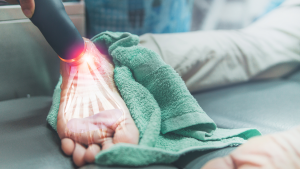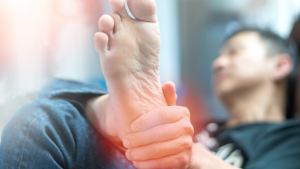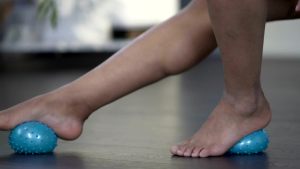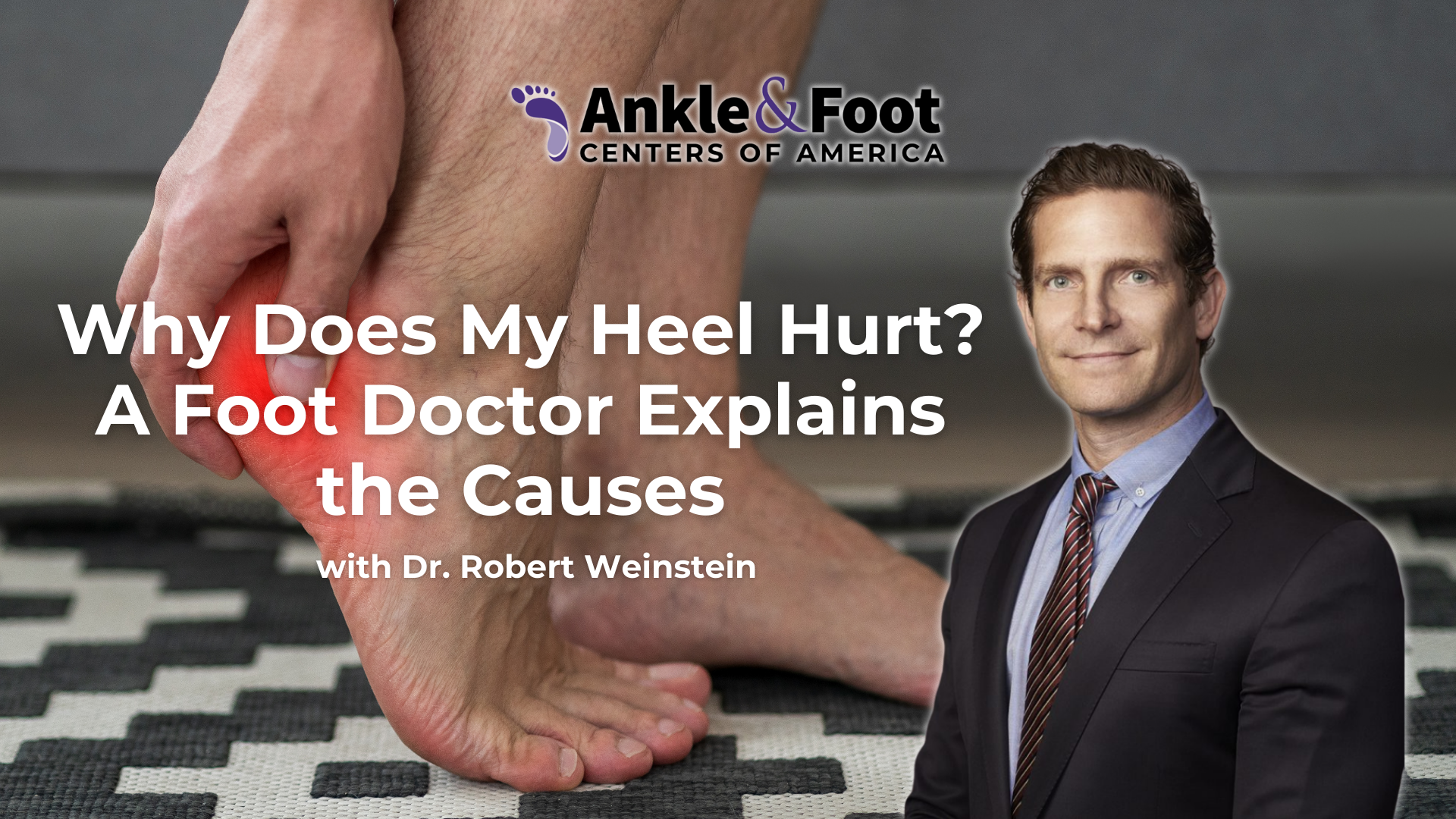Table of Contents
Introduction:
Why does my heel hurt? This is a common question for many who experience sharp, aching, or burning pain in their heel. Heel pain can make walking or standing uncomfortable and may disrupt your daily routine. Understanding the causes of this discomfort is the first step toward finding relief.
Heel pain can occur for different reasons. You might feel it when waking up, throughout the day, or only at night. While plantar fasciitis is a well-known cause, other conditions such as Achilles tendonitis, heel spurs, or nerve issues may also be responsible. In this article, we’ll explore both common and less-known causes of heel pain. We’ll also provide insight from a foot doctor on finding relief.
What Causes Heel Pain in the Morning?
 Many people experience heel pain during their first steps out of bed, which can be quite discomforting. The most common cause of this morning heel pain is plantar fasciitis. The plantar fascia, a thick band of tissue that runs along the bottom of your foot, often tightens while you sleep. When you get up in the morning, the sudden stretching of this tightened tissue can lead to sharp pain in the heel. This discomfort usually eases after a few minutes of walking, as the tissue gradually loosens up. However, if untreated, this morning pain can persist and worsen over time.
Many people experience heel pain during their first steps out of bed, which can be quite discomforting. The most common cause of this morning heel pain is plantar fasciitis. The plantar fascia, a thick band of tissue that runs along the bottom of your foot, often tightens while you sleep. When you get up in the morning, the sudden stretching of this tightened tissue can lead to sharp pain in the heel. This discomfort usually eases after a few minutes of walking, as the tissue gradually loosens up. However, if untreated, this morning pain can persist and worsen over time.
Another possible cause of morning heel pain is Achilles tendonitis. This condition affects the Achilles tendon, which connects the calf muscles to the heel bone. After a period of rest, such as sleeping overnight, the tendon can become stiff, causing pain when you first put weight on it. Unlike plantar fasciitis, Achilles tendonitis can cause discomfort not just in the heel but also along the back of the lower leg.
What Causes Heel Pain at Night?
On the other hand, some individuals primarily experience heel pain at night. This can be linked to tarsal tunnel syndrome, a condition similar to carpal tunnel syndrome in the wrist. Tarsal tunnel syndrome occurs due to pressure on the tibial nerve, which runs along the inside of the ankle. This pressure can lead to a burning or tingling sensation in the heel, which often intensifies in the evening when the body is at rest, making it difficult to relax or sleep.
Another reason for nighttime heel pain is diabetic neuropathy, a nerve condition that can occur in people with diabetes. Diabetic neuropathy affects nerve function and often leads to pain or numbness in the feet, including the heels. This type of pain tends to worsen at night, as reduced movement can lead to an increased awareness of discomfort.
Lastly, Achilles tendonitis can also cause pain in the heel during the evening. Throughout the day, activities such as walking, running, or standing for prolonged periods can put strain on the Achilles tendon. This cumulative stress leads to inflammation and can result in heightened pain by the end of the day, particularly when trying to rest.
Why Do My Heels Hurt?
 Heel pain can develop for many reasons, often as a result of daily habits or underlying health conditions. One major contributing factor is excessive pressure on the heel. This may occur from standing or walking for long periods, especially on hard surfaces. People who work on their feet all day are more likely to develop heel pain due to this constant strain.
Heel pain can develop for many reasons, often as a result of daily habits or underlying health conditions. One major contributing factor is excessive pressure on the heel. This may occur from standing or walking for long periods, especially on hard surfaces. People who work on their feet all day are more likely to develop heel pain due to this constant strain.
Another common cause of heel pain is poor footwear. Wearing shoes that do not provide adequate support or cushioning can put added stress on your heels. For example, high heels, flip-flops, or unsupportive flat shoes can lead to issues over time. Repeated wear can aggravate the plantar fascia or Achilles tendon, eventually resulting in chronic pain.
In addition, certain foot conditions can also contribute to heel discomfort. Plantar fasciitis is a frequent culprit, particularly for those with high arches or flat feet, which can alter the way pressure is distributed across the foot. Heel spurs, which are bony outgrowths on the underside of the heel bone, may also develop as a result of long-term stress and inflammation. These spurs can cause additional pain, particularly when putting weight on the foot.
Lastly, overuse injuries from physical activities, such as running, jumping, or intense exercise, are significant contributors to heel pain. Athletes and active individuals are more prone to conditions like Achilles tendonitis and stress fractures. These conditions arise from repetitive motion and can lead to ongoing heel pain if not properly addressed.
Why Does My Heel Burn and Hurt?
A burning sensation in the heel can be particularly concerning. One possible cause is tarsal tunnel syndrome. Another potential cause is peripheral neuropathy, especially in individuals with diabetes, which can lead to burning sensations in the heel due to damaged nerves. Severe plantar fasciitis may also cause a burning feeling when the tissue is highly inflamed.
Why Does the Back of My Heel Hurt After Running?
Pain at the back of the heel after running is often linked to Achilles tendonitis. This condition develops when the Achilles tendon, which connects the calf muscle to the heel bone, becomes inflamed due to overuse. Runners and athletes are particularly susceptible to Achilles tendonitis, as repetitive stress can lead to small tears in the tendon, resulting in pain and stiffness, especially after physical activity. Another possible cause is retrocalcaneal bursitis, which involves inflammation of the bursa, a fluid-filled sac located between the Achilles tendon and the heel bone, causing pain at the back of the heel.
Why Does the Inside of My Heel Hurt?
Pain on the inside of the heel is commonly caused by posterior tibial tendon dysfunction (PTTD). The posterior tibial tendon supports the arch of the foot, and when it becomes inflamed or damaged, it can cause pain along the inside of the foot, near the heel. Another possible cause is plantar fasciitis, especially when the plantar fascia becomes strained closer to the inner part of the heel. This pain may also be related to overpronation, which puts excess pressure on the inside of the heel while walking or running.
Why Does My Heel Hurt When I Run?
Heel pain during running can result from several different conditions. Plantar fasciitis is one of the most common reasons, where repeated stress on the plantar fascia leads to inflammation and sharp pain while running. Achilles tendonitis is another potential cause, as the Achilles tendon is subjected to significant strain during running. Improper footwear, lack of arch support, or running on hard surfaces can also exacerbate these conditions, increasing heel pain while running. Additionally, stress fractures of the heel bone may cause persistent pain during physical activities, including running.

Heel Pain Treatment Options
There are several effective treatments for heel pain, ranging from home remedies to medical interventions. Most cases improve with rest, ice, and stretching exercises. Physical therapy can also help by strengthening the muscles around the foot and ankle, reducing strain on the heel. In more severe cases, custom orthotics or supportive shoes may provide relief by redistributing pressure on the foot.
Non-Surgical Treatments
If the pain persists, non-surgical treatments can help manage heel pain. These include anti-inflammatory medications, corticosteroid injections, and shockwave therapy. These options target inflammation and help heal damaged tissues.
Surgical Treatment Options
Surgery is rarely needed but may be considered when other treatments fail. Surgical procedures like plantar fascia release or heel spur removal can provide long-term relief in severe cases.
When to Seek Medical Attention
You should see a doctor if your heel pain is severe, doesn’t improve with rest, or persists for more than a few weeks. Early intervention from a podiatrist can prevent further complications and provide a tailored treatment plan.






